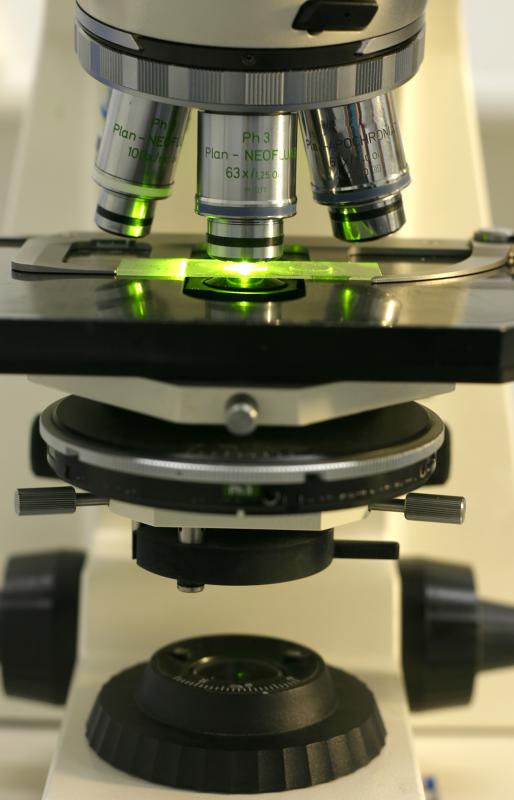At PracticalAdultInsights, we're committed to delivering accurate, trustworthy information. Our expert-authored content is rigorously fact-checked and sourced from credible authorities. Discover how we uphold the highest standards in providing you with reliable knowledge.
How do I Become a Genetic Engineer?
An individual who wishes to become a genetic engineer will likely have a strong interest in science. The path to genetic engineering is often fairly specific and includes many years of education. Specific skills may be required, such research skills and knowledge of specialized equipment. Current knowledge of scientific literature in the field is also often necessary to become a genetic engineer.
Genetic engineers are usually research scientists who work with animal, human, or plant genes. These individuals manipulate genes and produce living organisms. They may look for ways to fight or cure diseases. Genetic engineers often specialize in a particular scientific area, such as animal husbandry, and work in that field for their entire careers.

After completing high school, someone who wishes to become a genetic engineer should attend an accredited four year institution. Students should earn undergraduate degrees in a science-related field. Biology, chemistry, zoology, botany, or general science are all relevant options and will prepare the student for advanced study, which is the next step in the process of becoming a genetic engineer.

Generally, the advanced field of study should be chosen before applying to graduate schools. Some options for advanced study include genetics, microbiology, biochemistry, medical science, or biosciences. Courses in immunology and advanced genetics may also be included in the course of study.
Some students decide to spend an additional three to four years pursuing a doctoral degree in genetic engineering. Many individuals spend much of their doctoral study performing research or assisting in a lab in their specialized field of study. Concurrently, they will also draft and complete a dissertation that details their research or study.

Practical experience is important for individuals who wish to become a genetic engineer; in addition to work completed during the course of doctoral study, students may often benefit from lab courses. Professors or other contacts developed during study can often be good resources when study is complete and full time work is sought. Networking in the field while taking courses may improve the chances of obtaining a genetic engineering job.

In addition to formal education, genetic engineers need to be familiar with certain lab techniques and tools; for example, some work may require the use of scanners and microscopes. Analytical skills are important for interpreting results of lab experiments. Research and writing, in order to keep up-to-date in the field, are also important skills to have in order to become a genetic engineer.
AS FEATURED ON:
AS FEATURED ON:

















Discussion Comments
I'm pursuing an undergraduate degree of marine biology. Can I take a graduate degree of genetic engineering?
@bythewell - To me, those are problems with regulation, not problems with the engineering itself. You can't expect people not to use technology once it exists and there's too much potential for good if genetic engineering is used properly.
Properly being the operative term, and they need more good, sensible people looking for careers in genetic engineering, so that they can add to the voices wanting to regulate the technology.
@umbra21 - Well, there are lots of reasons to take a genetics course without wanting to do genetic engineering, or even agree with it.
Personally, I don't think there's anything wrong with studying genetics in order to breed better animals or understand genetic diseases, but I don't think people should be tampering with the genetic code itself.
It would just be too easy to make mistakes and, lets face it, we've already made some serious mistakes that weren't even all that difficult to see coming.
The big one I can think of is engineering canola plants so that they are extra healthy and can't be killed with herbicide. They made them like that so they could douse them in herbicide and kill off the weeds, but now those canola plants are becoming serious weeds themselves.
And that's not even touching the problems with companies trying to control farmers by patenting genetic material. It's not what being a scientist should be about.
I remember when I did my first genetics course at university and the lecturer dedicated a whole class to ethics and why he thought this was the way of the future.
There was a lot of controversy over genetic engineering going around at the time and a couple of students actually walked out on him, which I thought was ridiculous at the time, because why were they in a genetics lecture if they didn't want to learn about genetic engineering? I would have loved a genetic engineering career, but I went a different way in the end.
Post your comments